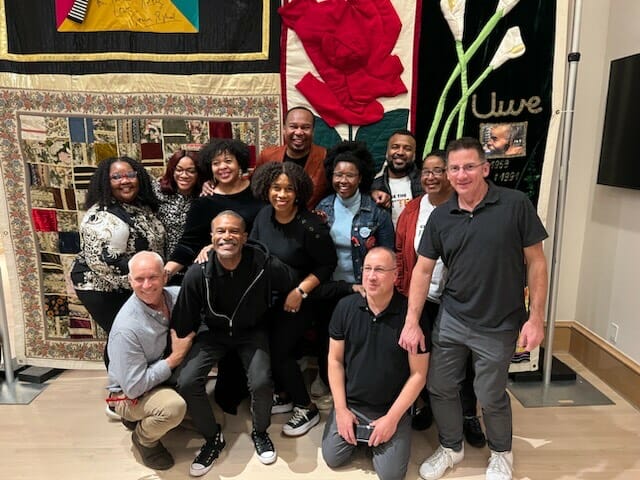The National AIDS Memorial (NAM), steward of the AIDS Memorial Quilt, has partnered with the Southern AIDS Coalition to launch a major initiative bringing sections of the Quilt to communities in the southern United States as a teaching tool in the fight against HIV/AIDS. The next stop is Louisiana in February 2023.
NAM is bringing sections of the AIDS Memorial Quilt to communities throughout the Southern U.S as part of Change the Pattern (CTP), a new initiative to reimagine the response to the epidemic in the region. Funded through a $2.4 million grant from Gilead Sciences, Inc., CTP is bringing sections of the Quilt to communities throughout the South to raise awareness about increased HIV rates, particularly among communities of color and marginalized populations. CTP made its first stop of 2022 in Jackson, Miss., during the city’s second ever Jackson City Pride.
This powerful and timely Quilt exhibition will feature more than 500 hand-stitched panels of the AIDS Quilt that honor Black and Brown lives lost to AIDS and feature many newly made Quilt panels from the local areas, which will be featured for the first time publicly.
Through local events and programming, Change the Pattern will actively engage communities through Quilt displays, interactive experiences, storytelling, advocacy, and panel-making workshops. By creating an empowering message and safe spaces for conversation, we can uplift, inspire, and encourage all communities to take an active role in their health, challenge cultural stigmas, and continue the legacy of advocacy for our marginalized brothers, sisters, and others.
From November 30–December 4 and in honor of World AIDS Day, the largest display of the AIDS Memorial Quilt in the state of Alabama was open to the public at the Kress at Dexter building thanks to CTP. Having made stops in Montgomery, Selma, and Birmingham, CTP had weeklong programming include quilting workshops, educational forums, a significant exhibition feature by legendary civil rights icon Rosa Parks, and a special screening and community conversation at the Montgomery Museum of Fine Arts called Surviving & Thriving with HIV: A Film Screening & Community Conversation Featuring Roy Wood Jr. The event included a screening of The National AIDS Memorial documentary series, Surviving Voices, as well as a special conversation Roy Wood Jr. (actor, comedian, Emmy-nominated executive producer, and activist best known for his role as a correspondent on The Daily Show with Trevor Noah; pictured below, right)) and Dafina Ward (Executive Director of Southern AIDS Coalition; below, left) to discuss the current political landscape of HIV in their home state.
Wood and Ward—two Alabamans and friends since high school—touched on the education they received surrounding sexual health as students growing up in Alabama and discussed the current threats to equitable primary, sexual healthcare judgment, and stigma around HIV, sex & gender identity, political implications and actions needed to #ChangeThePattern. As a correspondent on The Daily Show, Wood has the opportunity to reach a millennial and gen-z audience and to shift cultural consciousness around HIV/AIDS.
Wood is now a committed champion of CTP, having expressed his commitment to making a difference not only in his home state but in other communities of impact. Roy lent his voice to support the initiative by filming a PSA (above), which now appears on the National AIDS Memorial’s website and highlights the issue that CTP seeks to change in the Southern states with regard to HIV stigma and transmission in the Black and Brown community. (HIV/AIDS activist and Emmy-winning actor Sheryl Lee Ralph made her own tribute to CTP, below.)
“In the spirit of the Quilt and Changing the Pattern, I would like to see us focus on getting rid of that stigma,” said Quentin Bell, Executive Director of The Knights & Orchids Society Inc., talking with GLAAD’s Anthony Allen Ramos about the AIDS Memorial Quilt’s stop in Alabama. We have 40 million people who are living with HIV, so HIV, generally, is something that we can live with, and we can surely provide more resources to people living with HIV—but how do we get rid of that stigma that’s attached to HIV?… People are living with HIV, surely we can get to a point where they are thriving as well. If we can get rid of the stigma, we can move forward and get rid of HIV and find the cure.”
Change the Pattern’s next stop will be next February 2023 in Louisiana. We look forward to #ChangingThePattern with you. Additionally, CTP is thrilled to announce the continuation of the initiative throughout 2023 with stops in Tennessee, Florida, Georgia, Texas, North Carolina, South Carolina, and Kentucky. Stay up to date on the stops here.
Additional information:
- The Black community comprises only 26.5% of Alabama’s total population. However, it accounts for 71.8% of new HIV cases.
- In 2020, the South comprised 38% of the U.S. population but represented 52% of all new HIV diagnoses.
- The disproportionate burden of HIV in the South is among certain populations, such as Black women, Black and Latinx gay, and bisexual men, and Black and Latinx transgender women.
- Georgia, Louisiana, Mississippi, Texas, South Carolina, Alabama, North Carolina, and Tennessee rank in the top 15 states with the highest rates of HIV in the country.
- Racism, HIV stigma, homophobia, poverty, and barriers to health care continue to drive these disparities.
Go here for additional data from CTP on the specific challenges facing communities of color in the South.













